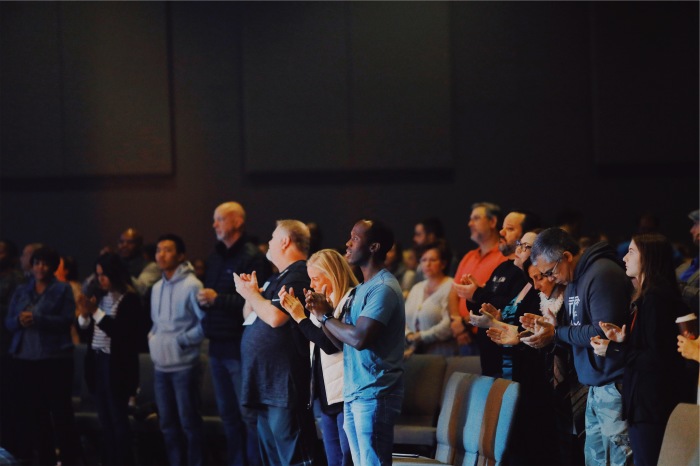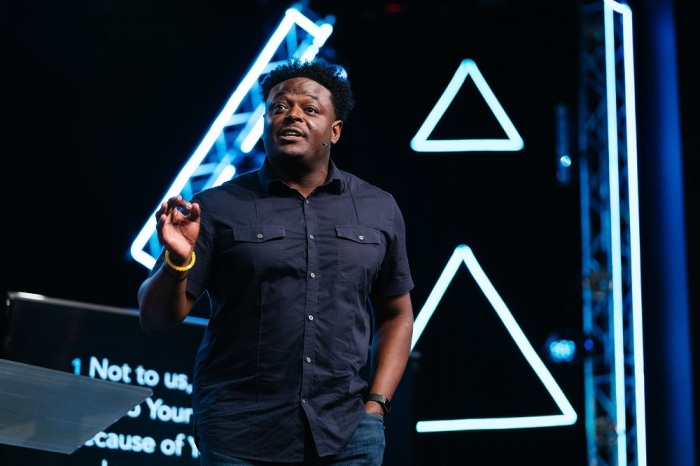Crisis in pastoral leadership: Are the apostolic and prophetic offices being restored?

An apostolic, prophetic church
For Derwin Gray, lead pastor of the multicultural Transformation Church in Indian Land, South Carolina, how the church understands and defines itself matters.
“When we talk about the ecclesia, when we talk about the Church, [its] blood-bought people who have been redeemed by King Jesus through His epic accomplishments, His sinless life, His atoning sacrificial death, His resurrection and through the sealing of the Spirit. We are this family,” Gray told CP.
The way Gray interprets his own church as apostolic is that they, as a group of followers of Jesus, are built on the apostles' message: Christ crucified and risen from the dead. He describes his congregation as rooted in the New Testament and the early church councils and the foundation of the apostles is what drives them.
A genuinely apostolic church is about the establishment of God’s rule and reign on Earth, and that those who trust in Jesus are part of His new creation, he said.
Gray added that a truly apostolic leader is a messenger planting such churches rooted in the historic realities of the Church.
To be prophetic, then, means: “Thus saith the Lord.”
“With the canon of Scripture, thus saith the Lord, is the text, the Scripture, primarily the redeeming work of Jesus through the Spirit to the glory of the Father,” the pastor said.
The gift of prophecy, as explained in 1 Corinthians, is for the purpose of edification, encouragement and speaking a timely word to people. It's to be twofold, he said, both to be “here’s what God says” and those gifted with the gift of prophecy who are used by God to edify and exhort the Church.
Both leaders who inhabit an office and laypersons who have the giftings can flow in the prophetic in this way, Gray said.
“We don’t view prophecy as ‘Hey, in three days this is going to happen.’ We view it as God spoke it, here’s the Word, and then the gift of prophecy in encouragement and edification.”

Where the Church is going in the coming years
Gray said there needs to be "local bodies of churches of all shapes and sizes."
“My main thing is that there is qualified leadership with integrity and that people are being equipped for the work of ministry," Gray explained. "That may be a house church or a big church, a small church. I’m not concerned about the form. I’m more concerned about the function. And every believer is a royal priest. Every believer has been enlisted in Jesus’ ministry and mission, and so that’s what we need to do.”
“This is not a job for me, this is a calling,” he said of his own role, “and our staff is called to serve our Body.”
According to the former NFL player-turned-pastor, being an apostolic church doesn't mean that "everyone on our staff is more spiritually mature than someone who works at Bank of America."
"Every believer is supposed to be equipped to be a minister and missionary in how you go about that in various forms, just go about it," he assured. "If it’s a house church, go about it. If it’s a megachurch, go about it.”
This will, however, require a paradigm shift for many American Christians, as many have accepted, perhaps unwittingly, varying degrees of what some call “consumerist Christianity.”
Gray attributes this to unwise pastors who teach an imbalanced theology where “Jesus basically functions as the dream-giver,” and believers are asked to participate in His Kingdom so that they can reach their potential.
The Gospel, by contrast, holds that Jesus is the King who invites people into His Kingdom by grace through faith, and the Holy Spirit equips in order to join in the call to reconcile everything in Christ, he said, referencing Ephesians 1:10.
“We’ve got to move from consumerism to participation," Gray stressed. "But pastors and leaders have to teach that, and a lot of times they are afraid to because America is a consumptive society and the great majority of the Church is also a consumptive society."
While churches of all shapes and sizes are everywhere, the Church-at-large in America is sick, he lamented.
“And I love [Jesus] too much to water down a message to draw consumers. God is calling people to participate in His Kingdom and it is by grace through faith. Jesus is Savior and Lord who wants to do His life in us and through us. And here’s what’s beautiful: When we get that, it’s so much better than consumerism,” the 50 year old added.
“And consumerism is like going into the candy store and getting sugar high and being sick for the rest of the week.”
What has contributed to this, he added, is the seeker-sensitive model that starts with the homogenous unit principle. The principle says if you cater to people who look and think alike and share a socio-economic status and ethnicity, you can grow a church faster. Thus, sermons are crafted for them.
“The problem is that the Bible never says that. The church is for Jesus,” he said.
“When Jesus is exalted,” he continued, quoting John 12:32, “it says He will draw all men unto Himself."
Gray believes that many pastors have been baptized into the homogenous unit principle. Many have learned that people really like the rousing, inspiring content, so they forsake the teaching of doctrine and theology and avoid controversial topics.
What that ultimately yields is a “baptized Ted Talk and sprinkle of pixie dust of Jesus sprinkled on top of it,” he quipped. Yet because that has broad appeal, the model makes money, creating the incentive for it to keep going.
There has to be a reformation among pastors where it is asked: “What is the King Jesus Gospel,” he continued.
“I firmly believe that it is expressed in Galatians 2:20 very beautifully. That I have been crucified with Christ, it is no longer I who live but Christ who lives in me. Though I live in this body by faith in the Son of God, who loved me and gave Himself for me. So Christ, God’s chosen One, God’s Elect, wants to live in us and through us to reproduce His life, and it’s by grace through faith."
Gray and his wife were under the conviction that the early Church was a multiethnic group of believers in Jesus that had unity through the blood of Jesus, of Jews and Gentiles. This is rooted in God’s promise to Abraham that he would be given a multiethnic family. Jesus, being the seed of Abraham, through his redemptive work not only forgives sins but creates a family of brothers and sisters of many colors.
The good news of the Gospel, which centers on the work of Christ on the cross, is that God is getting His family back. And as the family learns to love each other, they image forth the glory of God, and as an invitation into this family as well.
Yet, as children of the European Enlightenment, American Christians like to break everything down to pieces and parts, Gray said.
“And the reality is, the Hebraic understanding of our faith is the Hebrew Shema,” Gray said, which is, “You shall love the Lord your God with all your heart and with all your soul and with all your might. And you shall love your neighbor as yourself.”
'Underneath those sandcastles were idols'
Gray warned that there is "no domain in which the love of God in Christ does not influence and flex its muscle."
“And what has happened is that there are a lot of people who were involved in movements where they’ve seen incredible hypocrisy, where they’ve seen core leadership get up and speak an incredible sermon, thousands of people come to faith, but yet the pastors aren’t living the message," he continued.
"And I think for a lot of them, they were baptized into a thin shallow Gospel, and so they’re tired.”
This often sets in motion a process of deconstruction where they become progressive Left, he explained.
“When you deconstruct Jesus Christ, you’re no longer a Christian,” Gray emphasized.
“As a pastor-theologian, I think the Church needs to be more theological one, not less. I think the Church needs to be more Christological, not less. I think the Church needs to be more Gospel-centered, not less. I think we need to view the Church as an equipping institution.”
Speaking specifically to the American Church, Gray believes that many were like children on a beach building sandcastles.
“But we didn’t know that the tide was rising and it’s going to wash all that away. COVID-19 has been a rising tide that has washed those sandcastles away. And underneath those sandcastles were idols,” he offered.
He believes the Holy Spirit is challenging the Church, asking the Church if she is ready to do away with those idols, and allow Him to knock them down.
“Are you ready to allow me to tip over political nationalism idol, tip over the greed idol, the pride idol, are you ready to allow me to tip over the pornography idol, and so many more?” he asked.
“And so if we’re in a posture where God is saying, ‘Listen, it’s time for you to rediscover who I am and never forget that individual salvation only exists so God can have a Church, a family. And this family, when Jesus went to the Cross, sin died in His body, but in the resurrection, all of us went to live in His body."
“Thus, treat each other as such.”
Send news tips to: [email protected] Listen to Brandon Showalter's Life in the Kingdom podcast at The Christian Post and edifi app Follow Brandon Showalter on Facebook: BrandonMarkShowalter Follow on Twitter: @BrandonMShow




























